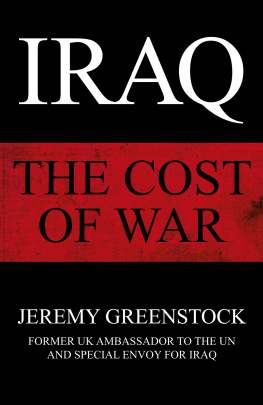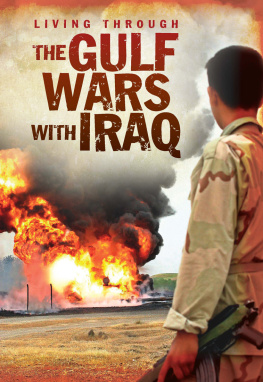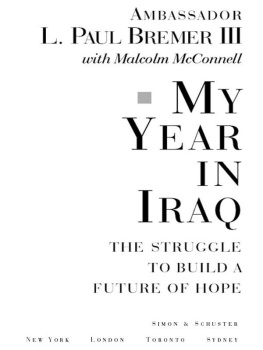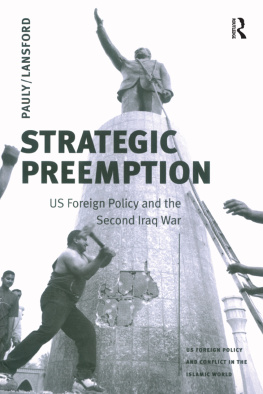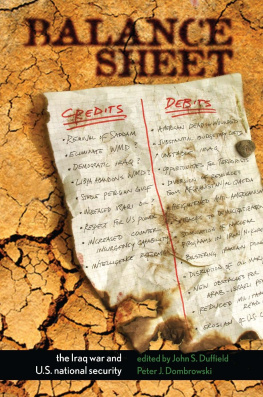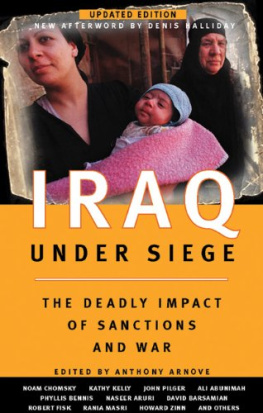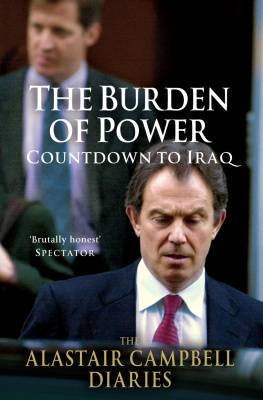IRAQ:
THE COST OF WAR
Jeremy Greenstock
Contents
Contents
About the Book
Tony Blairs decision to back George W. Bush in his attack on Iraq will go down as a defining moment for Blair, and for Britain. As Ambassador to the UN, Sir Jeremy Greenstock was centre stage in the dramatic months leading up to the Iraq war. After the war he was Special Envoy for Iraq, the UKs highest authority on the ground, and he worked side by side with Paul Bremer, the US administrator of the Coalition Provisional Authority, in Baghdad and saw first-hand the impact of the divisive turf wars back in Washington.
He kept a diary of what he witnessed in Iraq as the security situation deteriorated and has spoken remarkably candidly about the US-led administration. This extraordinary book is a record of everything he saw.
Greenstock writes openly about USUK relations and takes his readers behind closed doors in the tumultuous days leading up to the Iraq war. Through his eyes we see the actions and interactions of key players in New York, Washington, London, Paris and the Middle East. To what extent was the Bush administration determined to attack Iraq come what may? What promise did Blair extract in exchange for backing Bush? How important was Israel to American calculations? Was the war legal? What effect is it continuing to have on Britains long-term relations with America and Europe? No one is better positioned to set the story of Britains decision to go to war in its international context.
Held back from publication when originally written in 2005, and now revised with a new foreword and epilogue following the publication of the Chilcot Report, Iraq: The Cost of War is a dramatic and groundbreaking blow-by-blow account of one of the most pivotal and controversial conflicts in recent world history.
About the Author
Sir Jeremy Greenstock joined the Diplomatic Service in 1969. In the early 70s, he studied Arabic in Lebanon and was posted to Dubai and Washington. He later served in Saudi Arabia and Paris, worked on Bosnia and the Balkans in the 1990s, and returned for a second stint in Washington before becoming the Foreign Offices Political Director in London. Greenstock was UK Permanent Representative to the United Nations in New York from 1998 to 2003, and then went to Baghdad in September 2003 as UK Special Envoy for Iraq. He returned from Baghdad in March 2004 and retired from the Foreign Office. He subsequently worked as Director of the Ditchley Foundation and then Chairman of the UN Association in the UK, and is currently Chairman of Gatehouse Advisory Partners Ltd and of Lambert Energy Advisory Ltd.
This ebook is copyright material and must not be copied, reproduced, transferred, distributed, leased, licensed or publicly performed or used in any way except as specifically permitted in writing by the publishers, as allowed under the terms and conditions under which it was purchased or as strictly permitted by applicable copyright law. Any unauthorized distribution or use of this text may be a direct infringement of the authors and publishers rights and those responsible may be liable in law accordingly.
Epub ISBN: 9781473539532
Version 1.0
Published by William Heinemann 2016
1 3 5 7 9 10 8 6 4 2
Copyright Jeremy Greenstock 2016
Jeremy Greenstock has asserted his right under the Copyright, Designs and Patents Act, 1988, to be identified as the author of this work.
First published in 2016 by William Heinemann
Sonnets from China XV (Embassy), copyright 1939, 1945 by W. H. Auden, renewed 1973 by The Estate of W. H. Auden; from W. H. Auden Collected Poems by W. H. Auden. Reprinted by permission of Curtis Brown Ltd, and Random House, an imprint and division of Penguin Random House LLC. All rights reserved.
William Heinemann
The Penguin Random House Group Limited
20 Vauxhall Bridge Road, London, SW1V 2SA
www.penguin.co.uk
William Heinemann is part of the Penguin Random House group of companies whose addresses can be found at global.penguinrandomhouse.com
A CIP catalogue record for this book is available from the British Library
ISBN 9781785151255
For Anne,
who suspected long before I did that Saddam had no WMD
Foreword
In 2005 I wrote and submitted for publication a book about my involvement, as UK Ambassador to the United Nations and later as UK Special Envoy for Iraq, in the lead-up to the Iraq invasion of March 2003 and in the aftermath on the ground in Baghdad.
In July of that year, Jack Straw, then Secretary of State for Foreign and Commonwealth Affairs, asked me to delay publication until the Ministers involved had left office. He also expressed unhappiness with the concept of Government servants publishing comment on their official work. I therefore withdrew the text from the publishers and cancelled my contract with them. When the Chilcot Inquiry was set up in 2009, I decided to wait until the Inquiry reported before reconsidering publication. Now that the Report is in the public domain, I feel it is a more appropriate moment to re-present my account. While the Iraq story will never be anything but controversial, I hope the passage of time makes my decision to publish less problematic. I offer my apologies to those who disagree.
My main objective in writing this first-hand account had originally been to contribute to the history of the most significant foreign policy issue of the early years of the new millennium, and to attempt some wider lessons for policy-makers in the field of crisis-intervention. The subsequent inquiries in the United States and the United Kingdom, together with a number of books about the Iraq invasion and its aftermath, have largely performed this second function. But the British perspective of what happened behind the scenes at the UN in the lead-up to the invasion and in Baghdad during the Coalition period has not been presented in narrative form. I believe there is still room for a story to be told that sets in a live context the decisions taken and the mistakes committed, and perhaps makes more intelligible the swirl of conflicting considerations that weighed on political leaders at the time.
For this reason I have kept the original text of the 2005 book almost entirely unchanged. Some references to events and personalities have been clarified, to assist memories with the passing of time, and a few passages have been abbreviated where the detail has become unnecessary. But I have resisted the temptation to make any alterations with the benefit of hindsight.
The only new element is the Epilogue, written in the summer of 2016, which tries to summarise the impact of the Iraq saga on the countries involved in it, on the conduct of foreign policy since that time, and on the perception of military intervention as a foreign policy instrument. The second decade of the twenty-first century has brought us a world of much greater openness, equality and complexity, where the attempts of the more powerful nations to exercise their influence have begun to meet strong resistance both from lesser nations and from international public opinion. The use of hard power without an accompanying position of international legitimacy or persuasive justification has become much more difficult, even when a dictators defiance of the UN security Councils ressolutions presents an argument for action.

